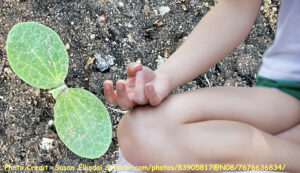This Shabbat we read parashat Behar, “on the mountain,” and from that mountain–Sinai–God gave Moses the commandments regarding Shmita and Yovel, the sabbatical and jubilee years, where the land was to lie fallow, not being planted or harvested. But wait, weren’t all of the commandments given by God to Moses on Mount Sinai? Yes, but for some reason, the Biblical Author chose to highlight this commandment, perhaps because at this point in time, the assumption was that entering the Promised Land was imminent, and this information would be needed immediately.
Shmita applies to agriculture in the land of Israel, and since most of us aren’t farmers–or living in Israel–we have to think about different ways to observe the Shmita year, which happens to be this year.
At its root (pun intended), by not planting or harvesting during the seventh year, we remind ourselves that the land doesn’t belong to us; in essence, we’re “tenant farmers” on God’s land. We work the land and reap its benefits and produce, but at the core, we’re mandated to care for the land. In Genesis 2:15 we read, “God settled the Human (Adam) in the garden l’ovdah u l’shomrah, to work it and to guard it.” A midrashic story reminds us that God took Adam around the earth, showing Adam its beauty, and reminded the Human to care for it, because if it were destroyed, there would be no one after them to restore it.
Elsewhere in the Torah, we’re given commandments regarding the treatment of our bodies, such as Lev. 19:28, to not cut our flesh or put “markings” on it. Our bodies and souls, as well as the land, are gifts from our Creator, and to be treated as such.
Two years ago, our worlds changed dramatically because of Covid, and as cases again rise in many areas, including mine, I’m thinking about a connection of Shmita and self-care and letting our bodies and minds “lie fallow.” This could mean cultivating a mindfulness or meditation practice, but it can also mean exploring ways to nourish ourselves; perhaps with a new hobby, reading something just for fun, virtually traveling to far-away places
Modern agricultural science reminds us that if we continue to plant the same things in the same spaces, eventually that land will become depleted. It’s the same with our bodies and our minds. Cultivate the lands within ourselves.
May we be blessed to make time in our daily and weekly lives to allow ourselves to rest so that we may enter a new time-space with renewed strength.











0 Comments